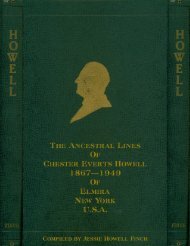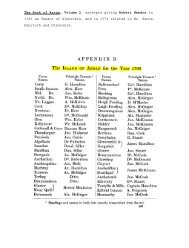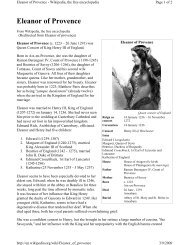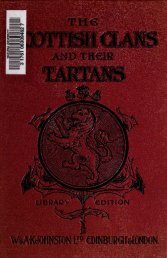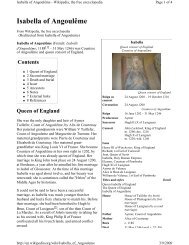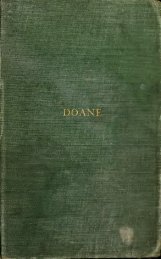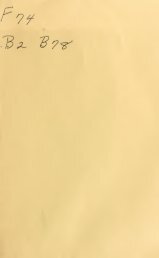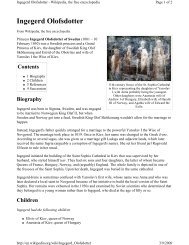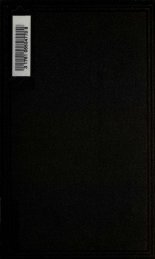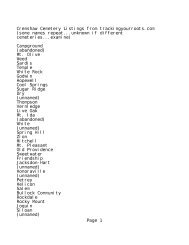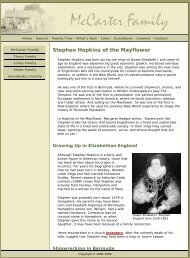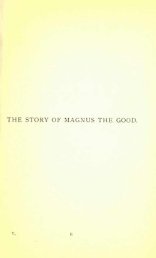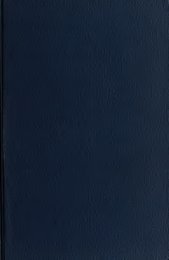- Page 3:
M L.? ALLEN COUNTY PUBLIC LIBRARY 8
- Page 9 and 10:
SPRINGFIELD 16^6-1886 HISTORY OF TO
- Page 11 and 12:
Two years ago to-day all Springfiel
- Page 13:
PREFACE. It is a fact worthy of not
- Page 16 and 17:
INTRODUCTION. fortunes with tliem,
- Page 18 and 19:
INTRODUCTION. vices, exaccors, aad
- Page 20 and 21:
INTRODUCTION. learning aud religion
- Page 22 and 23:
CONTENTS. protests. — The Arrival
- Page 24 and 25:
CONTENTS. CHAPTER XIII. — (1761-1
- Page 26 and 27:
CONTENTS. Webster. — Liquor Licen
- Page 28 and 29:
LIST OF ILLUSTRATIONS. The Bliss Re
- Page 31 and 32:
1657. The Eoxbury Settlers. — Cau
- Page 33 and 34:
SPRINGFIELD, 1636-1886. 3 historica
- Page 35 and 36:
SPRINGFIELD, 1636-18S6. this house
- Page 37 and 38:
The Roxblky Emigrants.
- Page 39 and 40:
SPRINGFIELD, I6S6-18S6. 9 As the ex
- Page 41 and 42:
SPRINGFIELD, 1636-1886. 11 William
- Page 43 and 44:
-ant fen. S' m hm T/a.me o/tt^
- Page 45 and 46:
SPRINGFIELD, 1636-1886. 15 friend,
- Page 47 and 48:
SPRiyOFIELD, 163G-1SS6. 17 was a be
- Page 49 and 50:
SPRINGFIELD, 16S6-1S86. 19 with spl
- Page 51 and 52:
SPRryGFIELD, 1036-1886. 21 the nati
- Page 53 and 54:
SPRINGFIELD, 1636-1SS6. 23 Court) a
- Page 55 and 56:
SPRIXiiFIELD, 1636-1S86. 25 I am co
- Page 58 and 59:
2S SPRINGFIF.LD, 1G30-1S86. that he
- Page 60 and 61:
30 SPRINGFIELD, 1630-1886. som were
- Page 62 and 63:
32 SPRINGFIELD, 1636-18S6. gift, be
- Page 64 and 65:
34 SPRINGFIELD, 1636-ISS6. This was
- Page 66 and 67:
36 SPRINGFIELD, 1636-1886. vival of
- Page 68 and 69:
38 SPRINGFIELD, 1636-1886. Reasons,
- Page 70 and 71:
40 SPRINGFIELD, 1636-1S86. Masou no
- Page 72 and 73:
42 SPRINGFIELD, 1636-1886. Mr. Hook
- Page 74 and 75:
44 SPRINGFIELD, I636-1SS6. lower ro
- Page 76 and 77:
46 SPRINGFIELD, 1636-1886. soe much
- Page 78 and 79:
48 SPRINGFIELD, 1636-1S86. man's lo
- Page 80 and 81:
50 SPRINGFIELD, 1636-1886. In April
- Page 82 and 83:
52 SPRINGFIELD, 1636-1886. against
- Page 84 and 85:
CHAPTER IV. 1640-1643. Eevival of t
- Page 86 and 87:
5)i SPRINGFIELD, 1636-1S86. appears
- Page 88 and 89:
58 SPRINGFIELD. 1636-1SS6. even the
- Page 90 and 91:
60 SPRINGFIELD, 1636-1886. After th
- Page 92 and 93:
62 SPRINGFIELD, 1636-1886. It is he
- Page 94 and 95:
64 SPRINGFIELD, 2636-18SG. Mr. Pyut
- Page 96 and 97:
66 SPRINGFIELD, 1636-1SS6. December
- Page 98 and 99:
6S SPRINGFIELD, 1636-1886.
- Page 100 and 101:
"0 SI'RFNGFIELD, IGSC-lSSe. 2 lot 2
- Page 102 and 103:
72 ' SPRINGFIELD, 1636-2886. give u
- Page 104 and 105:
74 SPRINGFIELD, 16S6-1SS6. cii)U's
- Page 106 and 107:
76 SPRINGFIELD, 1636-1886. powads,"
- Page 108 and 109:
78 SPRIXGFIELD, 1636-1886.
- Page 110 and 111:
80 SPRINGFIELD, 1636-1SS6. agree in
- Page 112 and 113:
82 SPRINGFIELD, 1636-1886. work or
- Page 114 and 115:
84 SPRINGFIELD, 1636-1S86. Hartford
- Page 116 and 117:
86 SPRINGFIELD, 1636-1SS6. had said
- Page 118 and 119:
S8 SPRINGFIELD, 1636-1886. 4. In th
- Page 120 and 121:
90 SPRINGFIELD, 16S6-1S86. to y"^ s
- Page 122 and 123:
92 SPRINGFIELD, 1636-1886. palisade
- Page 124 and 125:
94 SPRINGFIELD, 1636-18S6. Christia
- Page 126 and 127:
96 SPRINGFIELD, 16S6-1886.
- Page 128 and 129:
98 SPRINGFIELD, 1636-1886. The firs
- Page 130 and 131:
100 SPRINGFIELD, 1636-1886. soe dis
- Page 132 and 133:
102 SPRINGFIELD, 1636-1886. were ca
- Page 134 and 135:
104 SPRINGFIELD, 16S6-1886. heard o
- Page 136 and 137:
106 SFRIJVGFIELD, 1636-1886. were b
- Page 138 and 139:
108 SPRINGFIELD, 1636-1886. roused
- Page 140 and 141:
110 SPRINGFIELD, 1636-1886. longe m
- Page 142 and 143:
112 SPRINGFIELD, 1636-1886. his hom
- Page 144 and 145:
114 SPRINGFIELD, 1636-18S6. feriuff
- Page 146 and 147:
116 SPRINGFIELD, 1 636-1886. why Py
- Page 148 and 149:
118 SPRINGFIELD, 1636-1886. can fur
- Page 150 and 151:
120 SPRINGFIELD, 2636-1SS6. next Ge
- Page 152 and 153:
122 SPRINGFIELD, 1636-1886. acquain
- Page 154 and 155:
124 SPRINGFIELD, 1636-1886. uel Cha
- Page 156 and 157:
126 SPRINGFIELD, 2636-1886. taken u
- Page 158 and 159:
128 SPRINGFIELD, 1686-1886. In 1667
- Page 160 and 161:
130 SPRINGFIELD, 1 636-1886. meetin
- Page 162 and 163:
132 SPRINGFIELD, 1636-IS86. clared
- Page 164 and 165:
134 SPRINGFIELD, 1 636-1886. The fe
- Page 166 and 167:
136 SPRINGFIELD, 1636-1886. Sabbath
- Page 168 and 169:
138 SPRINGFIELD, 1636-1886. doe noe
- Page 170 and 171: 140 SPRINGFIELD, 1636-1886. frequen
- Page 172 and 173: 142 SPRINGFIELD, 1636-1886. slave,
- Page 174 and 175: 144 SPRINGFIELD, 1636-1886. turbanc
- Page 176 and 177: 146 SPRINGFIELD, 1636-1SS6. Eugland
- Page 178 and 179: 148 SPRINGFIELD, 1636-1886. charter
- Page 180 and 181: 150 SPRINGFIELD, 1636-1886. Certayn
- Page 182 and 183: 152 SPRINGFIELD, 1636-18S6. suing t
- Page 184 and 185: 154 SPRINGFIELD, 1636-1886. seem, i
- Page 186 and 187: 156 SPRINGFIELD, 1636-18S6. descrip
- Page 188 and 189: 158 SPRINGFIELD, 1636-1886. family,
- Page 190 and 191: 160 SPRINGFIELD, 1636-1886. leave u
- Page 192 and 193: 162 SPRINGFIELD, 1636-1S86. and I h
- Page 194 and 195: 164 SPRINGFIELD, 1636-18S6. at Hadl
- Page 196 and 197: 166 SPRINGFIELD, 1636-1886. All Ind
- Page 198 and 199: 168 SPRINGFIELD, 1636-1886. ou tlie
- Page 200 and 201: 170 SPRINGFIELD, 1 636-1886. • si
- Page 202 and 203: 172 SPRINGFIELD, 1636-1SS6. attack.
- Page 204 and 205: 174 SPRINGFIELD, 1636~1SS6. made th
- Page 206 and 207: 17(i SPRING FIELD, 1636-1S86. heral
- Page 208 and 209: 178 SPRINGFIELD, 1636-1886. The mee
- Page 210 and 211: 180 SPRINGFIELD, 1636-1886. attract
- Page 212 and 213: 182 SPRINGFIELD, 1636-1886. this pi
- Page 214 and 215: 184 SPRINGFIELD, 1636-1886. much mo
- Page 216 and 217: 186 SPRINGFIELD, 1636-1886. In Sept
- Page 218 and 219: 188 SPRINGFIELD, 1636-1886. of Spri
- Page 222 and 223: 192 SPRINGFIELD, 1636-1886. Dearefe
- Page 224 and 225: 194 SPRINGFIELD, 1636-1886. Bi'ewer
- Page 226 and 227: 196 SPRINGFIELD, 1636-1SS6. provisi
- Page 228 and 229: 198 SPRINGFIELD, 1636-1SS6. river t
- Page 230 and 231: 200 SPRINGFIELD, 1636-18S6. man of
- Page 232 and 233: 202 SPRINGFIELD, 1636-1SS6. handed
- Page 234 and 235: 204 SPRINGFIELD, 1636-1886. With al
- Page 236 and 237: 206 SPRINGFIELD, 1636-1886. heavier
- Page 238 and 239: 208 SPRINGFIELD, 163G-188G. ill 170
- Page 240 and 241: 210 SPRINGFIELD, 1636-1886. or dist
- Page 242 and 243: 212 SPRTNGFIELD, 1636-18S6. William
- Page 244 and 245: 214 SPRINGFIELD, 1636-1886. — . i
- Page 246 and 247: 21G SPRINGFIELD, 1636-1886. detecte
- Page 248 and 249: 218 SPRINGFIELD, 1636-1886. you for
- Page 250 and 251: 220 SPRINGFIELD, 2636-1886. Morgan,
- Page 252 and 253: 222 SPRINGFIELD, 1636-1886. da}' we
- Page 254 and 255: 224 SPRINGFIELD, 1636-1SS6. resente
- Page 256 and 257: 226 SPRINGFIELD. 1636-1886. sion il
- Page 258 and 259: 228 SPRINGFIELD, 2636-1886. the wat
- Page 260 and 261: 230 SPRINGFIELD, 1636-1886. Munn an
- Page 262 and 263: 232 SrRINGFIELD, 16S6-1SS6. among t
- Page 264 and 265: 234 SPRINGFIELD, 1636-1886. tion wo
- Page 266 and 267: 236 SPRINGFIELD, 1G36-1S86. satisfa
- Page 268 and 269: 238 SPRIXGFIELI), 1636-1SS6. Chaunc
- Page 270 and 271:
240 SPRINGFIELD, I636-I8S6. in the
- Page 272 and 273:
242 SPRINGFIELD, 1636-1SS6. whicli
- Page 274 and 275:
244 SPRINGFIELD, 1636-2SS6. '' prej
- Page 276 and 277:
246 SPRINGFIELD. 1636-I8S6. head of
- Page 278 and 279:
248 SPRINGFIELD, 1 636-1 SS 6. head
- Page 280 and 281:
250 SFRINGFTELD, 1636-1SS6. latter
- Page 282 and 283:
252 SPRINGFIELD, 2636-1886. to all
- Page 284 and 285:
254 SPRINGFIELD, 1636-IS86. stance
- Page 286 and 287:
256 SPRINGFIELD, 1636-1886. sous, J
- Page 288 and 289:
2o8 SPRINGFIELD, 1636-1886. fusing
- Page 290 and 291:
260 SPRINGFIELD, 1636-1SS6. Neither
- Page 292 and 293:
262 ."SPRINGFIELD., 1636-18S6. Gove
- Page 294 and 295:
CHAPTER XIIT. 1761-1783. Col. John
- Page 296 and 297:
2(^i] • SPRINGFIELD, 16S6~1SS6. s
- Page 298 and 299:
268 SPRINGFIELD, 1636-1886. period,
- Page 300 and 301:
270 SPRINGFIELD, 1636-1886. once be
- Page 302 and 303:
272 SPRINGFIELD, 1636-1S86. to seve
- Page 304 and 305:
274 SPRINGFIELD, 1636-2S86. Moneys
- Page 306 and 307:
276 SPRINGFIELD. 1G36-18S6. we have
- Page 308 and 309:
278 SPRINGFIELD, 1636-18S6. fiercel
- Page 310 and 311:
280 SPRINGFIELD, 1636-1886. traditi
- Page 312 and 313:
2S2 SPRINGFIELD, 1636-1886. To Arri
- Page 314 and 315:
284 SPRINGFIELD, 1636-1886. In June
- Page 316 and 317:
286 SPRINGFIELD, 16S6-1SS6. pany of
- Page 318 and 319:
288 SPRINGFIELD. 1636-1886. selecte
- Page 320 and 321:
290 SPRINGFIELD, 1636-1886. list wa
- Page 322 and 323:
292 SPRINGFIELD, 1636-1886. $1,400;
- Page 324 and 325:
294 SPRINGFIELD, 1636-1S86. without
- Page 326 and 327:
296 SPRINGFIELD, 16S6-1886. of n st
- Page 328 and 329:
298 SPRINGFIELD, 1636-1886. for Mas
- Page 330 and 331:
300 SPRINGFIELD, 1636-1S86. bridge,
- Page 332 and 333:
302 SPRINGFIELD, 1636-1886. Eveu be
- Page 334 and 335:
304 SPRINGFIELD, 1636-1886. strongl
- Page 336 and 337:
306 SPRINGFIELD, 1636-1SS6. liberti
- Page 338 and 339:
308 SPRINGFIELD, 1 636-1886. siou :
- Page 340 and 341:
310 SPRINGFIELD, 1636-1SS6. tress w
- Page 342 and 343:
312 SPRINGFIELD, 1636-1SS6. aud Joh
- Page 344 and 345:
314 SPRINGFIELD, 1636-1S86. inconsi
- Page 346 and 347:
316 SPRINGFIELD, 1636-18S6. We find
- Page 348 and 349:
318 SPRINGFIELD, I636-1SS6. of West
- Page 350 and 351:
320 SPRINGFIELD, 16.36-1886. " a pr
- Page 352 and 353:
322 SPRINGFIELD, 1636-1886. the rea
- Page 354 and 355:
324 SPRINGFIELD, 1636-1886. were hi
- Page 356 and 357:
32() SPRfNGFIELD, 1G36-1SSG. tlu'V
- Page 358 and 359:
328 SPRINGFIELD, 1636-18S6. with uo
- Page 360 and 361:
330 SPRINGFIELD, 2636-1SS6. not bee
- Page 362 and 363:
332 SPRINGFIELD, 1636-18S6. from su
- Page 364 and 365:
334 SPRINGFIELD, 1636-1SS6. '•'
- Page 366 and 367:
336 SPRINGFIELD, 1636~1SS6. without
- Page 368 and 369:
338 SPRINGFIELD, 1G36-1SS6. removed
- Page 371 and 372:
:;iimi::.;:i:i;!!!':
- Page 373 and 374:
SPRINGFIELD. 16SG^1S8G. Ml Hartford
- Page 375 and 376:
SPRINGFIELD, 16S6-1SS6. 343 Morgan
- Page 377 and 378:
SPRINGFIELD, J63G-2SS6. 345 were St
- Page 379 and 380:
SPRIXGFIELD, 1636-1SS6. 3-47 street
- Page 381 and 382:
SPRINGFIELD, 2636-1SS6. 349 laid he
- Page 383 and 384:
1784 Luther Hitchcock Ebeuezer Warr
- Page 385 and 386:
I SPRINGFIELD, 1636-1886. 353 be mu
- Page 388 and 389:
35(3 SPRINGFIELD, 1636-1886. shops
- Page 390 and 391:
358 SPRINGFIELD, 1636-18S6. underst
- Page 392 and 393:
360 SPRINGFIELD, 1636-1886. had a s
- Page 394 and 395:
362 SPRINGFIELD, 1636-18S6. subject
- Page 396 and 397:
364 SPRINGFIELD, 1636-1886. uot bou
- Page 398 and 399:
3C)G SPRINGFIELD, 1636-18S6. added
- Page 400 and 401:
368 SPRINGFIELD, 1636-1886. revolut
- Page 402 and 403:
370 SPRINGFIELD, 1636-1S86. bridge
- Page 404 and 405:
372 SPRINGFIELD, I636-1S86. acted a
- Page 406:
374 SPRINGFIELD, 1636-lSSG. at Uncl
- Page 410 and 411:
376 SPRINGFIELD, 1636-18S6. struggl
- Page 412 and 413:
378 SPRINGFIELD, 1636-1S86. and sub
- Page 414 and 415:
380 SPRINGFIELD, 1636-1SS6. of Chur
- Page 416 and 417:
382 SPRINGFIELD, 1636-1SS6. cliuset
- Page 419 and 420:
SPRINGFIELD. 1636-1886. 383 buildin
- Page 421 and 422:
SPRINGFIELD, 1636-1SS6. 385 contras
- Page 423 and 424:
SPRINGFIELD, 1636-1886. 387 coloniz
- Page 425 and 426:
SPRINGFIELD, 16H0-1S86. 389 a eiina
- Page 427 and 428:
SPRINGFIELD. 1636-1886. 391 Daniel
- Page 429 and 430:
SPRINGFIELD, 1636-1886. 393 Morgan
- Page 431 and 432:
SPRINGFrSLD, 1636-1886. 395 inittee
- Page 433 and 434:
SPRINGFIELD, 1636-1886. 397 Specime
- Page 435 and 436:
SPRINGFIELD, 1636-1886. 399 tary. T
- Page 437:
n^^T^^^-'t^^-j'x^ #'y
- Page 440 and 441:
402 SPRINGFIELD, 1636-1886. battle.
- Page 442:
404 SPRINGFIELD, 1636-1886. followi
- Page 445 and 446:
SPRINGFIELD, 1636-1SS6. 407 row ot
- Page 447:
w,- *• - t.W^l,C* :^-,^",.?pfVWK'
- Page 450 and 451:
410 SPRINGFIELD, 1636-1886. carryin
- Page 452 and 453:
CHAPIER XVIII. 1831-1841. The Era o
- Page 454 and 455:
414 SPRINGFIELD, 1636-1886. field.
- Page 456:
416 SPRINGFIELD, 1G36-1SS6. scribed
- Page 460 and 461:
418 SPRINGFIELD, 1636-1886. the spr
- Page 462:
420 SPRINGFIELD, 16S6-18S6. Hudson
- Page 466 and 467:
422 SPRINGFIELD, 1636-18S6. Springf
- Page 468 and 469:
424 SPRINGFIELD, 1636-1SS6. process
- Page 471 and 472:
SPRINGFIELD, 1636-1SS6. 425 William
- Page 473 and 474:
SPRINGFIELD, 1036-1SS6. 427 House,
- Page 475 and 476:
piiMlii»f||'iiri,iir .TPnffff;f"3f
- Page 477 and 478:
SPRINGFIELD, 1636-1886. 431 the peo
- Page 479 and 480:
SPRINGFIELD, 1636-1886. 438 lyro te
- Page 481 and 482:
SPRINGFIELD, 1636-1886. 435 niiniou
- Page 483 and 484:
SPRINGFIELD, 163G-18SG. 437 and Oli
- Page 486 and 487:
438 SPRINGFIELD, 1636-1 886. I'icli
- Page 489 and 490:
SPRINGFIELD, 16S6-1886. 439 noiiiiu
- Page 491 and 492:
SPRINGFIELD, 1636-1886. 441 IlarriH
- Page 493 and 494:
SPRIXG FIELD, 16S6-1SS6. 443 houu's
- Page 495 and 496:
SPRINGFIELD, 1636-1886. 445 He riva
- Page 497 and 498:
Gorham in command ; SPRINGFIELD, I6
- Page 499 and 500:
SPRINGFIELD, 1636-1886. 449 feeling
- Page 501 and 502:
SPRINGFIELD, 16S6-1886. 451 selves.
- Page 503:
Tlio! Cliulbuck, Cn-g-' Sprmglield.
- Page 506 and 507:
454 SPRINGFIELD, 1636-1SS6. "busine
- Page 508 and 509:
456 SPRINGFIELD, 1636-1S86. Board.
- Page 510 and 511:
458 SPRINGFIELD, 1636-1S86. their m
- Page 512 and 513:
460 SPRINGFIELD, 1636-18S6. George
- Page 514 and 515:
462 SPRINGFIELD, 1636-ISS6. George
- Page 516 and 517:
464 SPRINGFIELD, 1636-1886. hountli
- Page 518 and 519:
466 SPRINGFIELD, 1636-1886. work, a
- Page 520 and 521:
468 SPRINGFIELD. 1636-1S86. years b
- Page 523 and 524:
I SPRINGFIELD, 2636-1886. 469 steam
- Page 525 and 526:
SFRIXGFIELD, 16S6-1SS6. All ous ban
- Page 527 and 528:
SPR/iVG FIELD, 10.36-1SS6. 478 aud
- Page 529 and 530:
SPRINGFIELD, lOSG-lSSG. 475 hundred
- Page 531 and 532:
SPRINGFIELD, 16SG-1SS6. 477 Chronic
- Page 533:
^"S'-ii/lBIallkSms.aUmSc.lf^
- Page 536 and 537:
480 SPRINGFIELD, 1636-1S86. preside
- Page 538 and 539:
482 SPRINGFIELD, 1636-18S6. out of
- Page 540 and 541:
484 SPRINGFIELD, 1 636-1886. of the
- Page 542 and 543:
486 SPRINGFIELD, 1636-18S6. Haclley
- Page 544 and 545:
488 SPRINGFIELD, 1636-1886. substan
- Page 546 and 547:
I 490 SPRINGFIELD, 1636-1886. ^ Tot
- Page 548 and 549:
492 SPRINGFIELD, 1636-1SS6. whehnin
- Page 550 and 551:
494 SPRINGFIELD, 1636-18SG. even ap
- Page 552 and 553:
490 SPRINGFIELD, 1G36-18S6. men, au
- Page 554 and 555:
498 SPRINGFIELD, 1636-1886. whig le
- Page 556 and 557:
500 SPRINGFIELD, 1636-18S6. know-no
- Page 558 and 559:
502 SPRINGFIELD, 1636-1886. Dr, Cha
- Page 560 and 561:
50-i SPRINGFIELD, 1636-18S6. plante
- Page 562 and 563:
50() SPRINGFIELD, 1636-18S6. »grow
- Page 565 and 566:
SPRINGFIELD, 1636-1886. 507 warrant
- Page 567 and 568:
SPRINGFIELD, 2636-1886. 509 said to
- Page 569 and 570:
SPRINGFIELD, I636~1SS6. 511 Chapman
- Page 571 and 572:
SPRINGFIELD, 1636-1886. 513 with a
- Page 573 and 574:
SPRINGFIELD, 1636-18S6. 515 One cau
- Page 575 and 576:
SPRINGFIELD, 1636-1SS6, 517 hj'poth
- Page 577 and 578:
SPRINGFIELD, 1636-18S6. 519 But Mr.
- Page 579 and 580:
SPRINGFIELD. 1636-1886. 521 faithfu
- Page 581 and 582:
SPR IIVG FIELD, 1636-JS86. 523 nish
- Page 583 and 584:
SPRINGFIELD, 1636-1886. 525 Briggs,
- Page 585 and 586:
i chusetts, 1 others ' lowing ' the
- Page 587 and 588:
SPRINGFIELD, 1636-1886. 529 7, 1863
- Page 589 and 590:
SPRINGFIELD, 16S6-1S86. 531 the lat
- Page 591 and 592:
SPRINGFIELD, 1636-1SS6. 533 of the
- Page 593 and 594:
SPRINGFIELD, 1636-1SS6. 535 spondin
- Page 595 and 596:
i SrRIXGFTELD, 10S6-2SS0. 537 Josep
- Page 597 and 598:
SPRINGFIELD, 1636-1S86. 539 Fifth R
- Page 599 and 600:
SPRINGFIELD, 1636-1886. 541 ability
- Page 603 and 604:
\ riam SPRINGFIELD, 1636-1886. 543
- Page 605 and 606:
SPRINGFIELD, 1636-1886. 545 history
- Page 607 and 608:
SPRINGFIELD, 1636-1S86. 547 dered t
- Page 609 and 610:
SPRINGFIELD, 1636-lSSG. 549 Wilhrah
- Page 611 and 612:
CHOIR TUNES, — SPRINGFIELD, 1636-
- Page 613 and 614:
SPRINGFIELD, 1636-18S6. 553 Mrs. J.
- Page 615 and 616:
SPRINGFIELD, 16S6-1886. 555 After D
- Page 617 and 618:
SPRINGFIELD, 1636-1SS6. 557 Judge K
- Page 619 and 620:
SPRINGFIELD, 1630-JSS6. 559 countrj
- Page 621 and 622:
SPRINGFIELD, 1636-1886. 561 wick, H
- Page 623 and 624:
SPRINGFIELD, 1636-1886. 563 This an
- Page 625 and 626:
SPRINGFIELD, 1636-1S86. 565 in thes
- Page 627 and 628:
SPRINGFIELD, 1636-1886. 567 lands,
- Page 629 and 630:
SPRINGFIELD, I636-1S86. 569 The emi
- Page 631 and 632:
SPRIiYGFIELD. 1636-1S86. 571 by the
- Page 633 and 634:
SPRINGFTELD, 1636-JS86. ,-)73 ill t
- Page 635 and 636:
SPBINGFIELD, 1636-18S6. 575 liis en
- Page 637 and 638:
SPRINGFIELD, 1636-1886. 577 of Henr
- Page 639 and 640:
I SPRINGFIELD, 1636-1S86. 579 teen
- Page 641 and 642:
SPRINGFIELD, 16S6-1SS6. 581 farther
- Page 643 and 644:
SPRINGFIELD, 1636-ISS6. 5^;-} Pynch
- Page 645 and 646:
A quarter of a thousand years ago,
- Page 647 and 648:
In long and serried phalanx lined a
- Page 649 and 650:
n ; ; That Faith and Hope nnd hiipp
- Page 651 and 652:
SPRINGFIELD, 16SG-1SSG. 5J)1 Campbe
- Page 653 and 654:
SPRINGFIELD, 1636-1886. 593 Mk. Lat
- Page 655 and 656:
SPRINGFIELD, 1636-1886. 595 Mr. Cha
- Page 657 and 658:
SrRINGFIELD, 1G3G-1S86. 597 In an e
- Page 659 and 660:
SPRINGFIELD, 1636-1886. 599 necticu
- Page 661 and 662:
SPRINGFIELD, 1636-1886. 601 daughte
- Page 663 and 664:
SPRINGFIELD, 16S6-18S6. 603 one of
- Page 665 and 666:
SPRINGFIELD, 16S6-1S86. 605 after d
- Page 667 and 668:
SPRINGFIELD, 1636-1886. 607 was ord
- Page 669 and 670:
SPRINGFIELD, I636-1S86. 609 whom he
- Page 671 and 672:
SPRINGFIELD, 1636-1886. 611 the Uni
- Page 673 and 674:
SPRINGFIELD, 1636-1886. 613 moment
- Page 675 and 676:
SPRINGFIELD, 1636-1886. 615 were re
- Page 677 and 678:
SPRINGFIELD, 16S6~1SS6. 617 Two Mou
- Page 680 and 681:
620 SPRINGFIELD, 1636-1SS6. 1st. An
- Page 682 and 683:
622 SPRINGFIELD, 1636-1SS6. Wilcox
- Page 684 and 685:
624 SPRINGFIELD, 1G36-1SS6. Iserman
- Page 686 and 687:
626 SPRINGFIELD, 1636-1886. Watch C
- Page 688 and 689:
C28 SPRINGFIELD, 1686-18S6. The rou
- Page 690 and 691:
630 Bedortha, Joseph, 180, 197. Kei
- Page 692 and 693:
632 Chapin, Jonathan, Jr., 222. " J
- Page 694 and 695:
634 Dorchester, Anthony, 106, 110,
- Page 696 and 697:
636 Haynes, Gov. John, 'iQ, 41. Eev
- Page 698 and 699:
638 Marshfield, Samuel, lOi, 110, 1
- Page 700 and 701:
640 INDEX. Pringrydays, Edmund, 105
- Page 702 and 703:
642 Skipmuck, 208, 210, 266. Slaver
- Page 704 and 705:
644 INDEX. War of the Eebellion. Re



